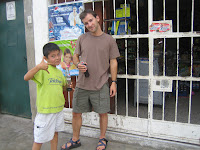*I wrote this article for an in-country publication to other health volunteers. My Jefe decided not to publish it, but I think its worth saving in this blog.
Trust Me-I´m a foreigner
Matt Lindsley, Perú 6
Back in 2005 when I arrived in Perú my host family in pre-service training warned me of their neighbors. They said they had kidnapped one of their cats and killed their dog. I could be next. Throughout the proceeding months I met many more Limeños, Ancashinos, and Liberteños. In general conversation with taxi drivers, bus passengers, and new co-workers, few Peruvians left out the reoccurring theme of making sure I was aware that A). I should be careful. B) Thieves will target me. And C). I shouldn’t ever trust strangers.
I began to feel a sense of insecurity and disappointment for host country nationals. Why do they speak so poorly of each other? Why were they quick to trust a foreigner and not their own countryman? What was it about this ubiquitous culture of accusation, fear, suspicion and distrust?
As I moved into my community and began to meet locals, we formed friendships. I developed a closeness to my family and I gained insight into the reasoning behind this notion. My community was very shy. On one hand they were eager to get to know me, but didn’t quite know how to approach me. There was this social awkwardness at first. Especially with kids. My mind shifted back to training and the repetitious topic of CONFIANZA. If I couldn’t earn to locals TRUST, I would be looking at a long 2 years ahead of me.
When out of site I usually stay with my same family in Trujillo. They provide meals and offer me a bed, free of charge. Consider it an extension of the house in Carata. My host mother would say. When I want to use the house phone, I always need to ask for the key-because it’s locked in a wooden console. And there is never toilet paper in the bathroom. Each family member brings their own roll in and out. The house maintains a small store, which is protected with a thick iron gate. All transactions are done between the bars.
I do not mean to trivialize the crime that exists. How many stories have I heard of relatives getting robbed or pick pocketed, buses being held hostage, and the typical looting and rioting in city streets. I only seek to understand an explanation of the origin of this behavior, both crime and distrust.
When my Mom and Uncle came to visit from the US, they too thought odd about the phone and toilet paper. It is my understanding that these safeguards are in place to impede an action from taking place. My uncle said, ¨This is a household not built on trust but built on distrust.¨ How can you raise a family that doesn’t even trust each other? And to an extent, that is how families are growing up- to not confide in each other.
If you can’t even trust your own father, mother, brother, sister, or child to not steal the toilet paper and not abuse the phone, of course you’d be skeptical of the neighbors, and the people across the street and the strangers living in our neighborhood- not to mention those from another town or another department! They must be CHORROS!
This paranoia must have roots that trace generations. Not too long ago in Peruvian history there were a couple of decades of terrorism, a coup d´ état, political instability and corruption. The alarming fact, that Peruvians know, is that their own people are responsible for its turbulent past. And that’s exactly why they trust you and I but few host country nationals.
I’m convinced that their horrific history has and will continue to manifest itself in modern day life, through the economy, business, tourism, local government, health and education. But when it seeps into the tightest woven structure of a society, the family, that’s disturbing.
I’m no sociologist, although it shouldn’t take one to recognize this cultural notion of desconfianza. We’re up against a tough system; fortunately we’re welcomed into this society and seen as a sense of hope. Take that and use it wisely. And when your work plans don’t prove immediate results, remember that this cultural notion exists everywhere and it may be to blame as a barrier to successful development work.
Subscribe to:
Post Comments (Atom)

2 comments:
very interesting!
ignorant. This happens everywhere; not only in Peru.
Post a Comment